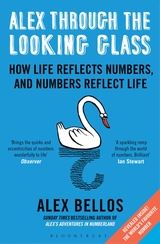Alex Bellos, “Alex Through the Looking Glass”
 I spent the better part of a morning reading bestselling author Alex Bellos’s absolutely delightful book Alex Through the Looking Glass: How Life Reflects Numbers, and Numbers Reflect Life. ( The American edition is called The Grapes of Math.) He uses anecdotes and examples from real life but neatly dovetails it with the history of modern mathematics, interweaving it with accounts of legendary mathematicians. Some of the text is very technical but is still accessible. This book is written for the layperson, not a specialist. But golly, this man is informative. I love the way he has strung together maths trivia with crucial bits of knowledge effortlessly. I admire the way he talk about eminent mathematicians as if they were his buddies but very respectfully places them in context. It could be Newton, Leibniz, Archimedes, Brahmagupta et al. He makes you chuckle when making reference’s to Euclid’s Elements reads like a recipe book.
I spent the better part of a morning reading bestselling author Alex Bellos’s absolutely delightful book Alex Through the Looking Glass: How Life Reflects Numbers, and Numbers Reflect Life. ( The American edition is called The Grapes of Math.) He uses anecdotes and examples from real life but neatly dovetails it with the history of modern mathematics, interweaving it with accounts of legendary mathematicians. Some of the text is very technical but is still accessible. This book is written for the layperson, not a specialist. But golly, this man is informative. I love the way he has strung together maths trivia with crucial bits of knowledge effortlessly. I admire the way he talk about eminent mathematicians as if they were his buddies but very respectfully places them in context. It could be Newton, Leibniz, Archimedes, Brahmagupta et al. He makes you chuckle when making reference’s to Euclid’s Elements reads like a recipe book.
And then I discovered this tweet. The book has been shortlisted for an award.
Alex Bellos (@alexbellos) tweeted at 3:22 PM on Wed, Aug 05, 2015:
Thrilled to make @royalsociety Winton Prize shortlist w @matthewcobb @WanderingGaia @jimalkhalili @jonmbutterworth +https://t.co/5y2aKNm7VP
(https://twitter.com/
His previous book, Alex’s Adventures in Numberland was shortlisted for the BBC Samuel Johnson Prize. Alex Bellos writes a blog for The Guardian. http://www.theguardian.com/profile/alexbellos It is worth browsing through. He makes maths fun!
He helps rearrange one’s muddled significance and timeline of eminent mathematicians through the ages but contextualises them very well, it won’t be easy to dismiss as “boring maths”. For instance, “Thales is ..the first person to have a specific mathematical discovery named after him: Thale’s Theorem, which states that the triangle inscribed inside a semicircle has a right angle. He also used his deductive powers to predict the solar eclipse of 585 BCE, and improve after a few bad years. He bought all the olive presses he could at rock bottom prices and when the upturn came he got rich. A century later, the comic playwright Aristophanes made fun of the great sage by having him fall in a ditch because he was lost in thought, gazing at the sky. Thales is not just remembered as history’s first mathematician and philosopher, but also as history’s first absent-minded professor.” (p.59)
Or the story about The Scottish Book
Between the First and Second World Wars, a clique of mathematicians in Lwow, Poland, met regularly in a coffee shop, the Scottish Cafe, to discuss mathematical morsels such as the pancake theorem. Hugo Steinhaus, a principal member of the group, wondered whether the theorem could be extended into three dimensions. ‘Can we place a piece of ham under a meat cutter so that meat, bone and fat are cut in halves?’ he asked. His friend Stefan Banach proved that such a cut is possible, using a theorem attributed to two others in a group, Stanislaw Ulam and Karol Borsuk. Banach’s result has subsequently been popularized as the ‘ham sandwich theorem’, because it is equivalent to stating that one can divide a ham sandwich in two with a single slice that cuts each slice of bread and the ham into two equal sizes, no matter how each piece is positioned and whatever is shape.
The mathematicians who gathered in the Scottish Cafe kept a thick notebook of all the questions they asked each other, which they entrusted to the care of the head waiter when they went home. Eventually known as The Scottish Book, it is a unique collaborative work, and not just because of how it was written. ( It was never published as a book, but some of its problems appeared later in journals.)
(p.236-7)
Ulam later joined the Manhattan Project.
I would strongly recommend buying this book. It is the kind of nonfiction book you dip into and come away feeling time has been well spent. It would also be a useful addition to the reference section of a library, particularly of schools.
Alex Bellos Alex Through the Looking Glass: How Life Reflects Numbers, and Numbers Reflect Life Bloomsbury, London, 2014, rpt 2015. Pb. pp. 340 Rs 399.
13 August 2015
